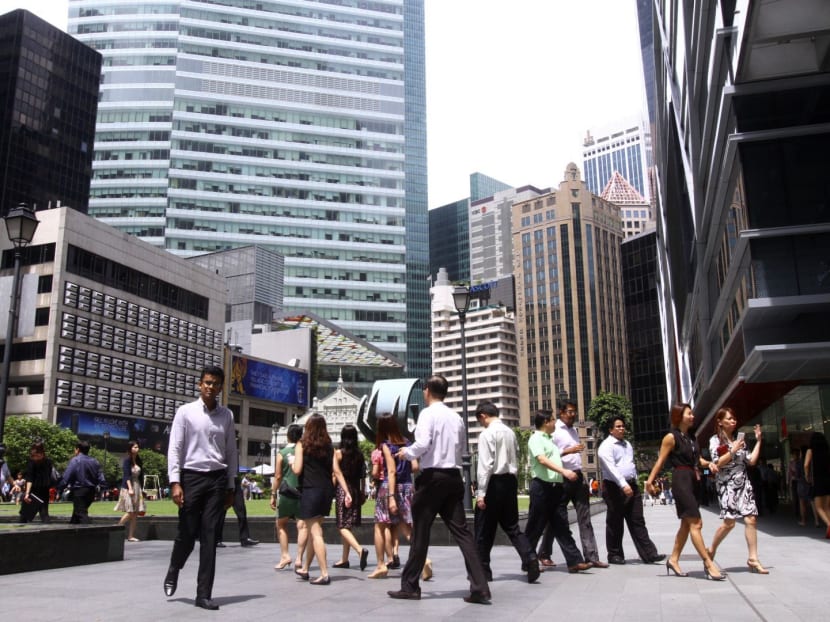Two-thirds S’porean core in workforce a firm target
SINGAPORE — The Government will hold fast to its goal of having a two-thirds Singaporean core in the economy, and this will be the structure of the country’s workforce in the “medium to long term”, Manpower Minister Lim Swee Say said.
SINGAPORE — The Government will hold fast to its goal of having a two-thirds Singaporean core in the economy, and this will be the structure of the country’s workforce in the “medium to long term”, Manpower Minister Lim Swee Say said.
Speaking to TODAY in an interview earlier this week, Mr Lim elaborated on the Government’s aim — which he mentioned in a Parliament sitting last month — of maintaining the 2:1 ratio of Singaporean workers to foreign employees.
“We are managing the growth of the foreign manpower at the pace in tandem with the growth of the local manpower,” said Mr Lim. “It’s important that we ensure that two thirds of our workforce will form a strong Singaporean core in our economy ... On the whole, we want to do our best to strike this balance.”
The move would not diminish Singapore’s standing as a global city and if a balance is struck, foreign investors would still find the country a good bet, he said. In fact, the Republic’s position as a talent hub would be enhanced, with leading multinational companies trying to ”take advantage of every headcount possible” to bring in the most qualified and experienced person, he said.
During the hour-long interview, Mr Lim also reiterated that the tightening of the Republic’s foreign manpower regime was not a reaction to past mistakes, but was rather a reflection that realities had changed. The inflow of foreign manpower was a hot topic during the 2011 General Election, and Mr Lim identified the “determination to manage” the growth of the foreign workforce here as the key shift in manpower policy since.
He stressed that it was “quite clear” that Singapore’s previous growth strategy had reached a point whereby it was “no longer sustainable — not necessarily immediately, but in the medium to long term”. “It’s not so much because the policy of the past was a mistake but rather, we are now having a new stage of growth and therefore we have to pursue a new direction,” he said.
Mr Lim pointed out that all global cities have restrictions on imported labour. “Not everybody from all over the world can just go to New York or London, take up a job and settle down. Management of foreign manpower in many global cities of the world, in fact, is a norm. So Singapore is no different from anybody else,” he added.
Nevertheless, he noted that some cities are very open to foreign manpower. However, in these places, locals go back to their homes in the countryside — a luxury that Singapore, as a city-state, does not have.
He added: “Every country has to find the right balance … But on the whole, I would say that we have managed the process a lot more effectively compared to some other cities and countries. Through the manpower quota system, we have ensured foreign manpower spread across all sectors and companies.”
In his interaction with representatives from multinational companies here, he noted that many of them recognised “that one reason why they are here is that they can tap on local talent”. “They do not see that this policy direction ... would limit their access to foreign manpower,” Mr Lim said.
He pointed out that having foreigners make up a third of the workforce would offer companies “tremendous scope” to bring in global talent. “One third is not a small percentage. In fact, in many countries, they are looking at much lower than one third,” he said.
Singapore is now more selective of the types of foreign workers it wants, Mr Lim said. For the rank and file workers, it would prefer those who are more skilful and more experienced. “We don’t want Singapore to be their learning ground,” he said.
For PMETs (professionals, managers, executives and technicians), the Republic is looking for those “who can bring the expertise and know-how to complement and supplement what we have in Singapore”, Mr Lim said.
In short, the emphasis is on quality over quantity — quality in terms of the foreigners’ relevance to Singapore’s future direction, Mr Lim explained. “Ideally, (a situation where) local and foreign PMEs are not competing for jobs in Singapore (but one where) Singaporean PMEs are working together with foreign PMEs to help us to compete for jobs with the rest of the world.”









